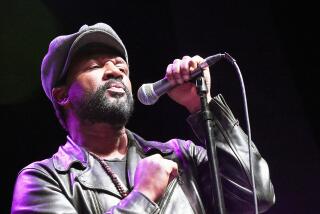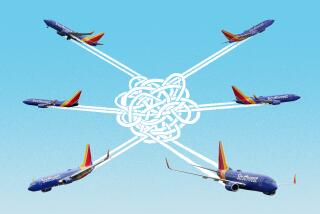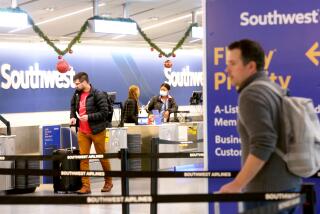Carty Has Been Forced to Guide AMR Through Turbulent Times
When Donald Carty became chairman of American Airlines in mid-1998, the key question was whether he could fill the shoes of his legendary predecessor, Robert Crandall. But Crandall never faced the crises that Carty has already endured at American’s helm.
For the second time in two months, Carty is being forced to grapple with the loss of scores of passengers and employees killed in the crash of an American Airlines jetliner. After two of his planes were hijacked and used in the terrorist attacks Sept. 11, another flight crashed Monday outside Kennedy International Airport, killing all 260 aboard and at least five on the ground.
Yet even as he counsels victims’ survivors near the crash site, Carty must tend to other urgent matters. He has to help convince a skittish public to fly again in the aftermath of Sept. 11, and deal with the furlough of several thousand American workers whose jobs were cut as the airline retrenched after the attacks. Business fliers need to be lured back despite the weak U.S. economy, and he must comply with a host of new air-security and federal-bailout issues that require constant interaction with government officials.
He also has to keep running the world’s biggest airline along with its parent company, AMR Corp., of which Carty also is chairman and chief executive. That means ongoing negotiations with American’s unions, whose relationship with American’s management has long been marked by strife. And Carty must oversee a challenge of his own making: the integration of Trans World Airlines, which Fort Worth-based AMR bought last April.
“We are clearly in unprecedented times, and there are no training manuals for this,” said Ron Kuhlmann, vice president at Roberts, Roach & Associates, a consulting firm in Hayward, Calif. Airline chiefs such as Carty “have been forced into roles that just weren’t required of them a few months ago.”
And Carty’s agenda could get even more crowded. With the industry losing billions of dollars and no major rebound in passenger traffic in sight, some analysts are predicting more mergers--and that Carty and American will be in the thick of it.
“Unless a lot of magic traffic numbers suddenly appear--and [Monday’s] crash doesn’t help matters--consolidation is going to be profound within a year” in the industry, said Richard Aboulafia, an analyst with the Teal Group, an aerospace consulting firm in Fairfax, Va. “Carty will find himself as the point man for the restructuring of the U.S. airline industry.”
Carty, 55, generally gets high marks from analysts for steering American away from the combative culture instilled by Crandall, who was widely regarded as a brilliant visionary but a confrontational executive. A tall, lanky native of Canada with white hair, Carty brought a more relaxed attitude to American, which now has 110,000 employees and 982 aircraft flying to 240 cities worldwide.
But Carty also is a tough negotiator who’s had his share of disputes with American’s unions, including a costly fight with its pilots’ union in 1999. As one of American’s former chief negotiators, Carty would sometimes bring a toothbrush to the table--a symbol of his preparation for a long showdown to reach a contract suitable to management.
Even so, Carty in some ways hasn’t set American apart from the rest of the airline industry, which was in big financial trouble before the attacks. Since Carty took over as chairman, for example, AMR’s stock price has plunged 80%--about the same as the industry overall. Much of that decline occurred after Sept. 11. AMR closed Tuesday at $17.01 a share, up 52 cents for the day, on the New York Stock Exchange.
He has also been unable to avoid the massive cuts that rival carriers have made since then; American eliminated 20% of its operations and slashed 20,000 jobs.
From Hockey Dreams
to a Harvard MBA
Carty, who dreamed of being a hockey star while growing up as one of six children, earned an MBA at Harvard University and began his career at Air Canada. American hired him in 1978 and he rose to controller before leaving in 1985 to be chief executive at CP Air, now part of Air Canada.
Carty returned to American after just two years at CP Air, and as he rose through the ranks he became Crandall’s chief lieutenant. Prior to being named chief executive, Carty was the executive in charge of running the daily operations of American and its regional airline, American Eagle.
Only a year after being hand-picked by Crandall to be CEO, Carty ran smack into the union for American’s pilots, the Allied Pilots Assn., when the APA objected to the airline’s purchase of tiny Reno Air. The deal touched off an illegal sickout by the pilots, forcing American to cancel some 6,700 flights over several days in February 1999, disrupting travel for more than 600,000 passengers and costing the carrier more than $200 million. The union later was fined $45.5 million by a federal judge for ignoring a back-to-work order.
Regardless, Carty and American decided to buy near-bankrupt TWA, which gave American a valuable hub in St. Louis and strengthened the airline’s domestic network. The TWA deal largely has been supported by organized labor and Carty has won praise for how TWA is being melded into American.
But the merger occurred just as the entire industry was flying into turbulence after several years of prosperity. With the economy slowing, business travel fell sharply and leisure traffic dropped as well. At the same time, American’s labor and jet-fuel bills were rising, and it still had hefty financing costs covering its aircraft.
The result: AMR reported a net loss of $550 million in the first half of this year. Then came Sept. 11, followed by the two-day shutdown of civilian air travel.
That caused a $414-million loss for AMR in the quarter ended Sept. 30--the worst in the airline’s history.
Today, with traffic still depressed, American is still losing several million dollars a day, though it does have more than $2 billion in cash and $508 million in federal bailout money.
American should survive the industry’s crisis and Carty isn’t expected to face the same fate as James Goodwin, who recently was ousted as chief executive of rival United Airlines after a series of missteps, analysts said. But Carty’s management skills will continue to be pushed to the limit, they added.
“He’s done a good job,” Teal Group’s Aboulafia said of Carty. “But you have to look at this whole period as just an interim step” in fixing a “damaged” airline industry.
More to Read
Inside the business of entertainment
The Wide Shot brings you news, analysis and insights on everything from streaming wars to production — and what it all means for the future.
You may occasionally receive promotional content from the Los Angeles Times.










